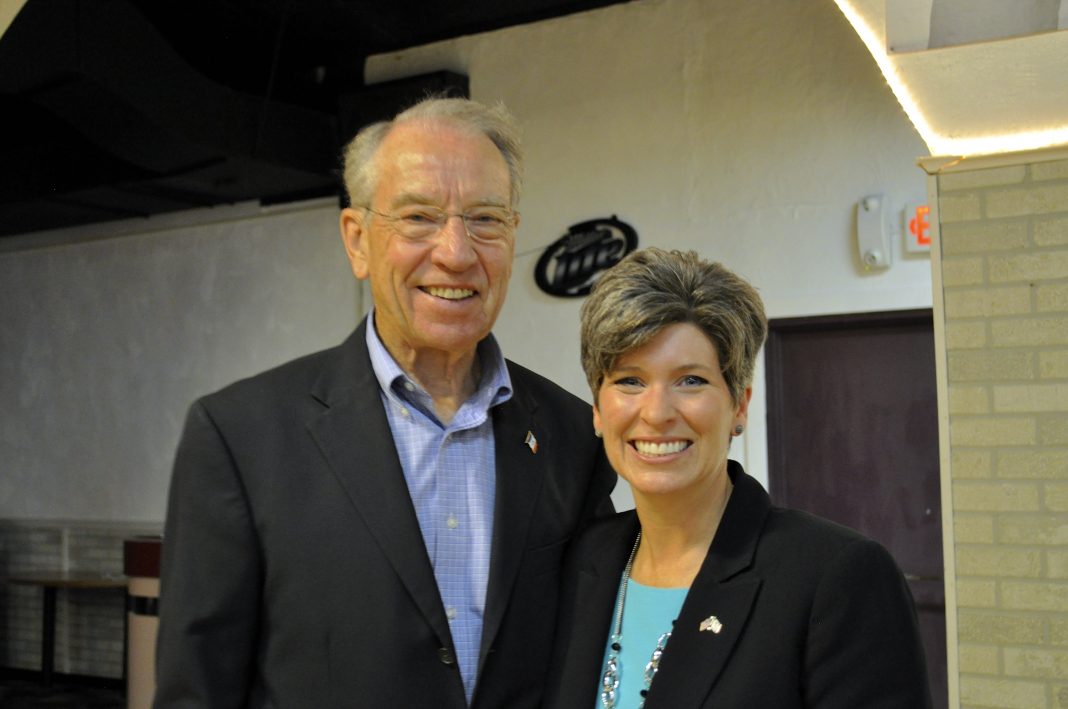U.S. Senator Joni Ernst (R-IA), a member of the Senate Environment and Public Works Committee, and her fellow Iowan, Senator Chuck Grassley (R-IA), are commending the Trump Administration for successfully rolling back the harmful Obama-era “Waters of the United States” or “WOTUS” rule and replacing it with a workable rule that clearly defines what waters fall under federal jurisdiction. This regulatory certainty will continue to help spur economic growth.
“For years, Iowans have told me what an egregious overreach Obama’s WOTUS rule was, giving the federal government authority to regulate 97 percent of the land in Iowa. That’s absurd, and it’s why I’ve worked hard to get rid of it,” said Senator Ernst. “After working relentlessly alongside the Trump Administration, I’m proud that we’ve successfully scrapped this Obama-era rule and are now providing the predictability and certainty our hardworking farmers, manufacturers, and landowners in Iowa deserve. Under President Trump’s leadership, we’ve fought to get the government off the backs of farmers and business owners and have had major wins on trade – like the USMCA, the phase one China deal, and the Japan agreement – all of which are spurring a sense of optimism and economic growth across rural America.”
“President Trump deserves credit for following through on his promise to repeal this Obama-era rule that would have defined 97 percent of Iowa as a waterway,” Grassley said. “Giving the federal government the power to regulate nearly all of Iowa would have been an economic catastrophe. My neighbors who farm in Butler County shouldn’t have to get permission from bureaucrats in Washington to move soil on their own land. This was just another example of out-of-touch and ill-conceived government overreach. This new rule will help keep our water and land clean without destroying Iowa’s small businesses and family farming operations.”
The Trump Administration’s Navigable Waters Protection Rule lists four categories of waters that are “waters of the United States,” and subject to federal jurisdiction. It also clearly describes the types of waters that will not be considered “waters of the United States.” For example, the rule makes clear that most ditches, prior converted cropland, and groundwater will not be federally regulated.
Background:
Some highlights of Senator Ernst’s work on WOTUS since first being elected to the Senate:
- Applauded the Trump Administration’s “Step 1” rule that officially rolled back the 2015 WOTUS rule, and restored longstanding and familiar Clean Water Act regulations..
- Introduced her own legislation, the Define WOTUS Act, which would codify a reasonable definition of WOTUS into law, clearly defining what is, and is not, a federally regulated waterway.
- Introduced a resolution that expresses the need to vacate the Obama Administration’s WOTUS rule.
- Praised the bipartisan passage in both chambers of her resolution of disapproval to eliminate the expanded definition of the WOTUS rule. The Obama administration vetoed this legislation and Senator Ernst vowed to continue looking for ways to roll back the WOTUS rule.
- Called out the EPA’s illegal use of taxpayer dollars to rally support for the harmful WOTUS rule.
- Spoke on the floor of the Senate to urge support for her resolution of disapproval to eliminate the expanded definition of the WOTUS rule.
- Cosponsored Senator John Barrasso’s (R-WY) proposal, which provided clear principles and direction for the EPA to craft a WOTUS rule that takes into consideration positions held by key stakeholders.
- Denounced the EPA’s finalized WOTUS rule as harmful to Iowa.
- Welcomed Iowa farmer and small business owner, Darcy Maulsby, to testify on the impact of WOTUS before the Small Business and Entrepreneurship Committee, and share her personal experience with the harmful impact of EPA overregulation.
- Invited former EPA Administrator Gina McCarthy to Iowa to see the potential impact of overregulation in Iowa. Administrator McCarthy never took Senator Ernst up on this offer.
















